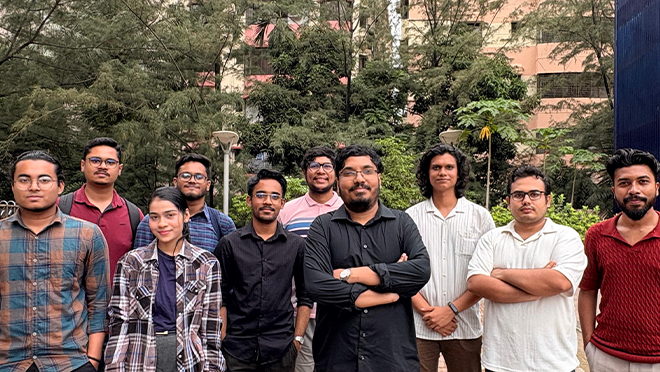NSU Center for Quantum Computing: The country’s first quantum research center is here, and why it matters
NSU Center for Quantum Computing: The country’s first quantum research center is here, and why it matters

Quantum computing — once confined to theoretical physics labs — is now making its way into real-world problem solving, from protecting financial data to improving early disease detection and forecasting floods. And for the first time, it is taking firm root in Bangladesh.
The recent launch of the North South University Center for Quantum Computing (NCQC) marks a significant step toward the future of quantum research in Bangladesh. As the country’s first dedicated quantum research facility, it places Bangladesh among a growing list of nations investing in what many believe to be the next era of computing.
But what is quantum computing anyway, and why does it matter?
Unlike classical computers that process information in binary bits – either 0s or 1s – quantum computers use quantum bits, or qubits, which can exist in multiple states at once. This enables them to process certain types of problems far faster than conventional systems. Though still in its early stages, quantum computing has shown immense promise in fields like cryptography, drug development, and machine learning.
For Dr Mahdy Rahman Chowdhury, Director of NCQC and Associate Professor at NSU, the launch of the centre is both a professional milestone and a personal calling. “This moment holds immense personal significance for me,” he said.
“It marks one of the notable milestones in my career, not just as a researcher, but as someone deeply committed to advancing our nation’s position in the global scientific community.”
Dr Chowdhury’s journey began during his PhD studies, drawn in by the elegance of quantum mechanics and the possibilities of computation at the subatomic level. The absence of institutional resources did not stop him.
During the Covid-19 lockdown, he conducted a series of online training sessions on quantum mechanics and computing. Students from across the country joined, many of whom later became involved in actual research.
Those lectures, he believes, were the seed. “They helped students to learn these topics and ultimately led quantum computing research in Bangladesh to reach this advanced stage,” he said.
Now, with a formal centre, the work has scaled. Dr Chowdhury and his team are focusing on some of the most urgent global challenges. Their research areas include quantum cryptography, quantum machine learning, and quantum key distribution. These may sound abstract, but the applications are not.
For instance, Bangladesh’s rapid move toward digital governance and mobile financial services comes with growing cybersecurity threats. Classical encryption systems could become obsolete the day powerful quantum computers arrive — a moment known as ‘Q-Day’.
“A central motivation behind our research agenda is the impending threat of ‘Q-Day’, when quantum computers become powerful enough to potentially break existing classical encryption systems,” Dr Chowdhury mentioned.
“Our work seeks to proactively address this risk by developing quantum-resilient infrastructures and protocols.”
However, Dr Chowdhury is not working alone. The centre has a small but dedicated team of research assistants, some of whom were once his students. Despite limited funding and a lack of experimental infrastructure, they have ambitious plans, including the establishment of Bangladesh’s experimental photonic quantum lab.
“We are actively seeking strategic partnerships and grants to realise this vision,” he said.
The human side of the story, though, is what shines most. Much of Dr Chowdhury’s work has involved directly mentoring students through hands-on projects under NSU’s senior design courses. Though the university does not yet offer a dedicated quantum degree, these projects serve as a gateway for many into the field.
“Despite the limited number of seats in these courses, we have been able to nurture a group of highly capable students,” he said.
Then comes the question whether Bangladesh has the talent pool to support such research.
“Absolutely!” said Dr Chowdhury.
“The challenge lies not in the availability of talent, but in how we nurture and retain it. Many of the country’s brightest minds seek opportunities abroad due to better infrastructure. The goal of NCQC is to build a platform that allows them to stay and thrive.”
Dr Chowdhury is aiming to connect quantum research to national needs. According to him, in the field of cybersecurity, sensitive government and financial data could be better protected through the use of quantum-secure systems.
In healthcare, drug discovery processes might be accelerated with the application of quantum machine learning. In agriculture, improved weather modelling could be achieved through quantum algorithms, leading to increased crop yields.
Quantum technologies also hold strategic importance. Dr Chowdhury said that they could help establish Bangladesh as a ‘forward-thinking actor in regional security architectures’.
Still, he does not gloss over the difficulties. “The biggest challenge in developing quantum research in a country like Bangladesh is the lack of institutional and infrastructural support,” he noted.
What is needed, in his view, is a national vision and collaborative efforts across government, academia, and industry.
For now, the NSU Center of Quantum Computing is less a high-tech fortress and more a modest space shaped by persistence and belief. There is no multimillion-dollar equipment or hefty grants — just a handful of passionate researchers with a clear sense of purpose.
The purpose is simple: to show that Bangladesh, too, is ready to stake a claim in the technologies that will define the future.
For those willing to get involved in a field as complex as quantum research, Dr Chowdhury’s advice is to remain curious and keep learning.
“Start small, stay consistent, and keep asking questions,” he said. “No matter your background, what truly matters is your willingness to learn and grow.”


